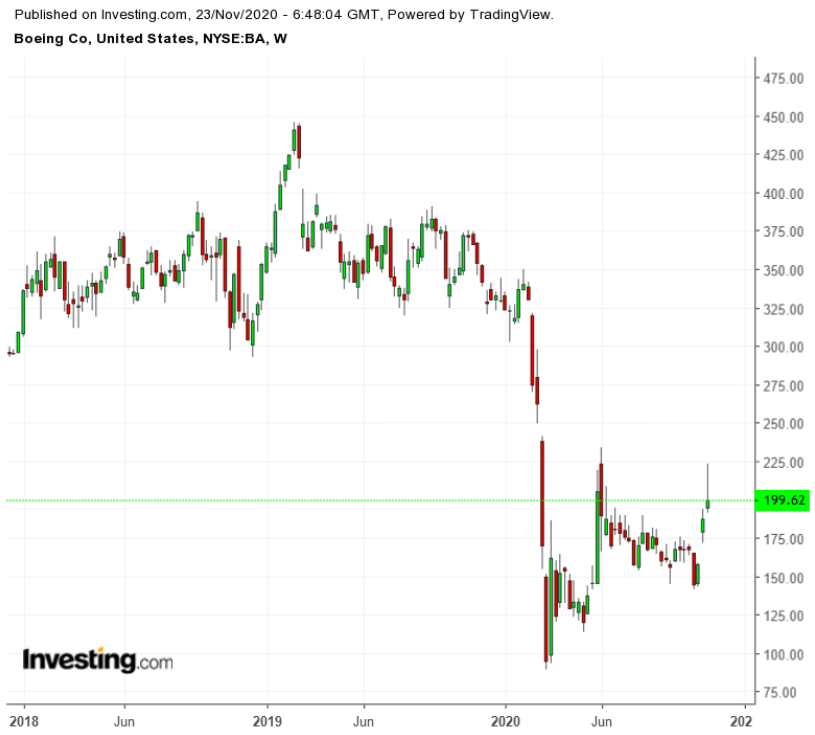Boeing's stock (NYSE:BA) is showing increased strength after the US Federal Aviation Administration (FAA) last week lifted its ban on the company's 737 MAX jet. Investors who are once again buying the aerospace giant’s stock are hopeful that the plane maker is out of the woods after two years of turbulence.

During the past month, the company's shares have gained more than 20%, adding to the 110% rise since the March dip. The stock closed on Friday at $199.62, after falling about 3% from the previous day's close. Despite its overall 2020 acceleration, the stock remains lower by more than 35% for the year.
Receiving clearance for the company’s flagship MAX plane to take off again is a big deal for the company and its investors. Before it was grounded worldwide in March of 2019 after two fatal crashes involving malfunctions in its automated safety system that killed 346 people, the 737 MAX was Boeing’s best-selling aircraft.
On Wednesday, the FAA allowed the Chicago-based aeronautics giant to resume delivering the jets to airlines and cleared the planes to carry passengers, pending completion of certain mandatory fixes and additional pilot training requirements. US carriers said last week that they would broadly reintroduce the MAX into their schedules starting early next year, while FAA chief Steve Dickson said he expected approvals from some foreign regulators within days.
Boeing shares have gradually gained ground over the past six months on hopes that the MAX resumption will ultimately come. Now that Boeing seems to be getting on track after a long and painful two years, the major focus shifts to the company’s business turnaround amid the COVID-19 pandemic.
Damaged Cash Flows
The MAX disaster and pandemic-triggered travel bans have damaged Boeing's cash flows and its future earnings potential. Getting that fixed is going to be a long, uphill battle.
Even if the MAX jetliner gets all the global approvals needed to fly again, its contribution to Boeing's cash flow is very much dependent upon the airline industry's ability to resume normal operations after the pandemic.
One major indicator worth watching closely is how quickly Boeing is able to clear its unsold inventory of the jets, where the company’s major portion of cash flows are currently stuck. In the third quarter, inventories rose to almost $87 billion, accounting for the MAX in storage and a recent accumulation of undelivered 787 Dreamliners.
Chief Executive Officer Dave Calhoun and Chief Financial Officer Greg Smith told investors last month that the company faced a shrinking market that’s likely to remain depressed for years. Given the uncertain market conditions, Boeing doesn’t expect to be cash-flow positive until 2022, a one-year-longer delay than the company's earlier forecast.
But Boeing bulls have their eyes set on the post-pandemic recovery in air travel, the outlook for which has been brightened after coronavirus vaccine breakthroughs this month. According to CEO Calhoun, if a COVID-19 vaccine is widely available by the middle of next year, it could help turn around Boeing’s crises, leading to a “run on the bank” for narrow-body airplanes. He further assured markets, “It’s going to be the response when the recovery really does come,” he said last month in a Wall Street Journal interview.
Bottom Line
In the short-run, Boeing stock is reflecting the recent positive headlines, including the potential resumption of MAX flights. But getting the plane cleared for takeoff doesn’t mean that it’s soon to be business as usual.
Boeing will have to adjust to the new market realities where air travel will take some time to recover while keeping the aviation market depressed. Despite this tough operating environment, Boeing is a great long-term buy even after this recent rally. Boeing stock is bound to keep moving higher once the MAX is fully operational and the pandemic is behind us.
